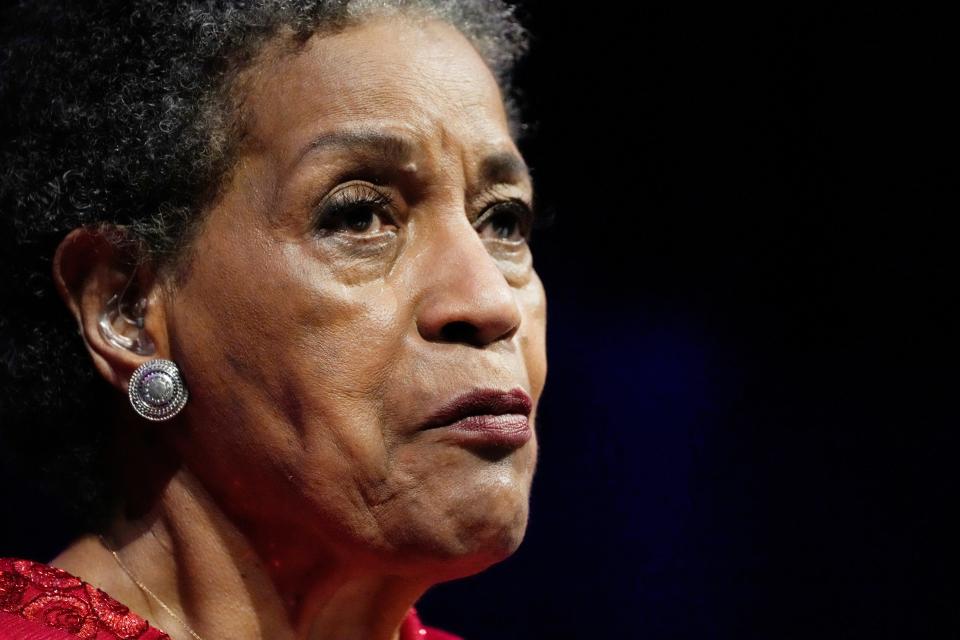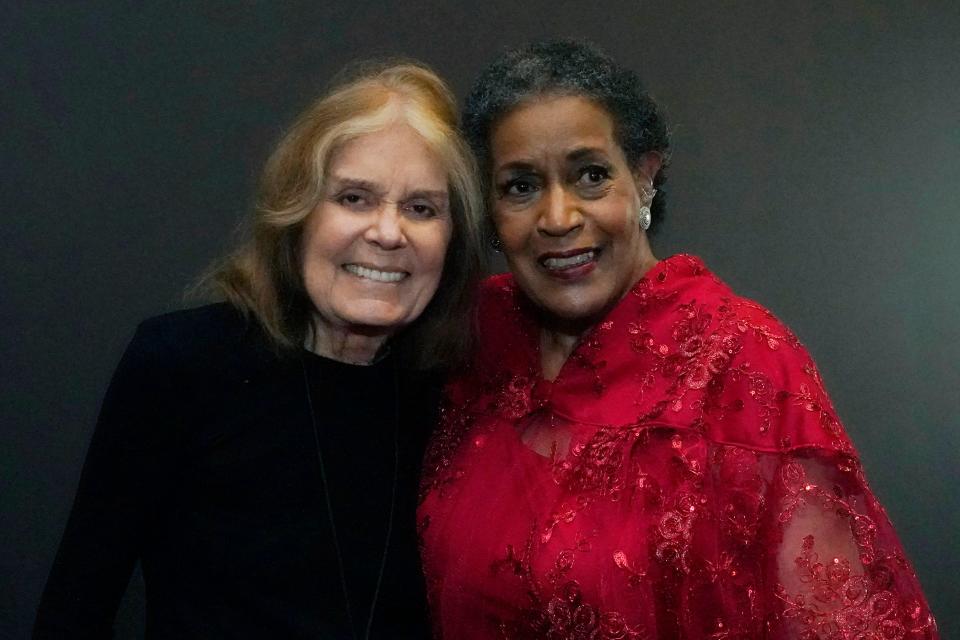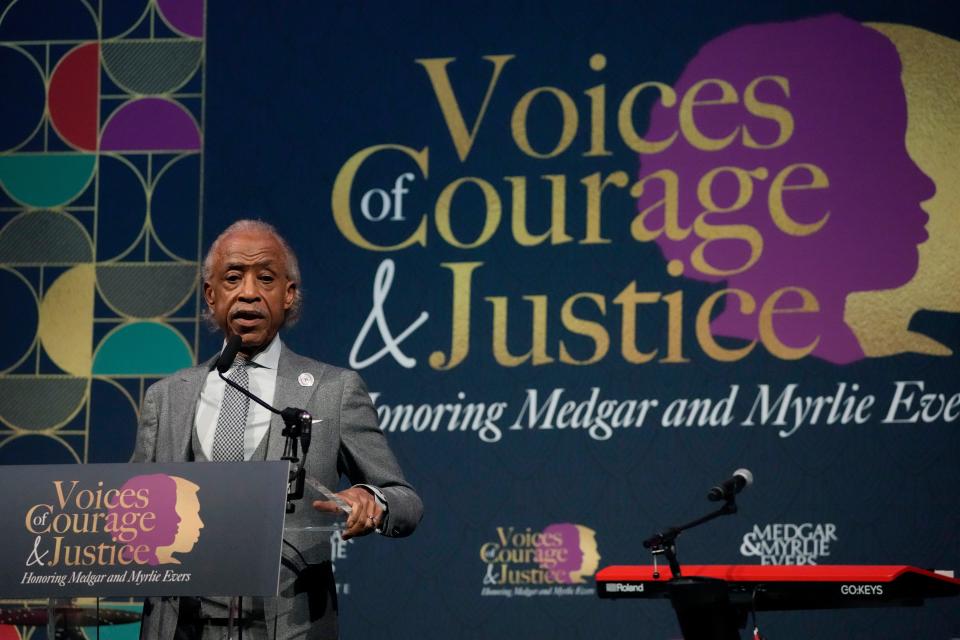Medgar Evers assassination: Myrlie Evers-Williams recounts the details
The ballroom went silent, and guests sat in awe as the last and most important speaker, Myrlie Evers-Williams, took the stage.
Evers-Williams, 90, was honored with a lifetime achievement award as part of The Medgar and Myrlie Evers Institute’s Voices of Courage and Justice Gala, which was held Friday night to commemorate the 60th anniversary of the assassination of her husband, civil rights activist and the NAACP's first field secretary in Mississippi, Medgar Evers.
Evers, along with his wife, is known for his work to end segregation in Mississippi, as well as the country, in the 1950s and 60s and for advocating for equal access and voting rights for African-Americans. He was shot in the back by white supremacist and Ku Klux Klan member Byron De La Beckwith on Evers' front doorstep after returning home to Jackson. The home was established as a national monument in 2020 and is now known as The Medgar and Myrlie Evers Home National Monument.
Evers-Williams daughter, Reena Evers-Everette, the executive director of The Medgar & Myrlie Evers Institute, presented the award to her mother.
"You through your grief have comforted us, your children, your friends and we in turn have learned compassion, empathy and the word love," Evers-Everette said. "I am honored at this time to present my mother the Medgar & Myrlie Evers Institute lifetime achievement award."
Evers-Williams, insisting on taking the stage, stood in a red, flowing dress and unflinchingly told the story of the night her husband was killed.

“When he came home that night, got out of his car. The children were on the floor, they jumped and they said ‘That’s daddy!’ A car door closed; the shots rang out. Those two elder children caught the legs of their little baby brother and pulled him down on the floor with them — just as Medgar taught them to do. I made that mad dash to the door and there he was. The father of my children, the love of my life,” Evers-Williams said.
She remembered looking at her dying husband and saying, “I will get whoever did this to you.”
“I was full of vengeance,” Evers-Williams said.
She would spend the next three decades seeking justice for her husband’s murder after two trials in 1964 with all white jurors failed to reach a verdict. She became a civil rights activist in her own right and was the first Black woman to serve as a commissioner on the Los Angeles Board of Public Works.
It wasn’t until 1994 that Beckwith was finally found guilty of murder after the state reopened the investigation.
‘We worked hard and even in the state of Mississippi justice prevailed and the man who was responsible for Medgar Evers’ death paid the price at least part of the way,” Evers-Williams said. “It has taken me, my friends, much longer to get through that veil of hatred. And I don’t say that proudly as I stand here before you. But it was motivation to keep me going, to keep me fighting, to see that justice prevailed. Justice did prevail.”

A year after she saw the man who murdered her husband finally convicted, Evers-Williams became the chair of the NAACP board in 1995 — only the third woman in its history to hold the position at the time.
She finished her speech by being honest with the crowd saying there was still some anger, but even more so —determination. She was determined to keep the memory of Medgar Evers alive, the work he did in the Civil Rights Movement and to support others who have followed in his footsteps.
“I move forward at this age being thankful for all of the blessings that I have had. Medgar Evers was the biggest, the largest outside of our children,” Evers-Williams said. “There is power in strength, there is power in anger, there is power in forgiveness, and I have sampled all of those. I am so thankful for this gathering tonight. I am so thankful for your acknowledgement of Medgar Evers and his life. Of being kind to his family … and I thank you ever so much as we all move together in the future, not only for Mississippi but for the United States of America. And I ask you to please always keep Medgar Evers memory in your minds and in your hearts. I thank you.”
Rev. Al Sharpton pleads to never forget the Evers and other civil rights activists

Reverend Al Sharpton flew into Jackson for the gala as the keynote speaker. He urged those in attendance to continue the fight for equality and civil rights that the Evers’ had a hand in starting.
Sharpton was introduced by Jackson Mayor Chokwe Antar Lumumba who was the first to speak at the event. During Lumumba’s speech, he reaffirmed that the statue in front of city hall of President Andrew Jackson will be taken down. Andrew Jackson was a slaveholder and an architect of the Trail of Tears, marching the Native American population from the Southeast to Oklahoma at a great loss of life.
The Jackson City Council voted to remove the statue back in July 2020. At the time Lumumba said that he would like a statue of Medgar Evers to take its place.
Sharpton started his speech by piggybacking off Lumumba’s comments and reminded the crowd that it was Andrew Jackson who appointed the fifth Chief Justice of the Supreme Court Roger Taney, who is known for his majority opinion in the 1857 court case Dred Scott v. Sandford. Taney authored the majority opinion of the case saying that African American’s were not U.S. citizens and could not have the same rights as whites, therefore Congress could not prohibit slavery in U.S. territories. Sharpton also reminded the crowd that one of the first things President Donald Trump did when he took the oval office was hang up a picture of Andrew Jackson.
“But we’ll see if Andrew Jackson’s picture is in the courthouse when they arraign him on Tuesday,” Sharpton said, referring to the recent indictment of Trump for allegedly mishandling classified indictments and storing them in his home at Mar-A-Lago.
After, Sharpton gave a nod to Congressman Bennie Thompson who was in attendance. He commended Thompson for his role as chair of the United States House Select Committee, which investigated the Jan. 6 attack of the U.S Capitol Building in 2021.
One of the main points Sharpton made is that the struggle for equal rights must continue and has now extended not just to African-Americans, but also to the Hispanic and LGBTQ communities, as well as women.
But too often, Sharpton said, people forget about the civil rights activists in the past who fought and shed blood so that people could be “in the position we are now to continue the fight.” He said that although the country just got out of the Covid-19 pandemic, there is another one.
“There is another pandemic out here called ‘negro amnesia,’ that’s negroes that forgot where they come from and forgot how they got where they got.” Sharpton said as people cried out in agreement. “They the one’s that get up in legislative chambers and act like they got there because they was smarter than the rest of us.”
Sharpton continued to ask the crowd to never forget the activists from the past who “laid their life down,” referring to the assassination of Evers and the bombing of 16th Street Baptist Church bombing that killed “four Black little girls.”
“Quit complaining about times are hard. Times been harder than this, but we had people that were harder than the hard times they were in and stood up and fought and fought because they hoped that if they would fight that we would redeem the fight and keep the struggle going,” he said. “So that’s why we’re here. To celebrate, commemorate, but also continue.”
Sharpton finished his speech by calling Mississippi one of the main battlegrounds for the struggles the Civil Rights Movement fought against and "emboldened and energized" the movement. He pleaded to the audience to not "go to sleep now."
"If Mississippi dies, the movement dies. If the memory of Medgar and Myrlie dies, our children will not know who they are," Sharpton said. "I hope 60 years later we will remember the blood that was shed and remember this queen who took her children and kept on raising and went all the way to chair the NAACP! Never stop fighting!"
This article originally appeared on Mississippi Clarion Ledger: Medgar Evers home Gala celebrates Civil Rights activists


